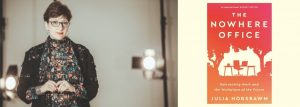
Buxton is at the epicentre of the post-pandemic revolution in how we work, business expert Julia Hobsbawm believes.
A hybrid of working from home (WFH) and traditional office-based hours was already developing before Covid struck, she argues in her book The Nowhere Office, which Julia will discuss in The Pavilion Arts Centre on July 8 as part of Buxton International Festival.
And it will be places like Buxton which could see the biggest economic benefits as workers, especially free-lancers in the knowledge-based industries, choose a better work/life balance in attractive towns close to the countryside.
In The Nowhere Office, she argues that now is the time to turn work into something more creative and satisfying by taking a strategic look at issues including the UK’s stagnant productivity and workplace stress.
Julia, who was awarded the OBE for her services to business, has already begun researching Buxton’s potential, focusing on the co-working spaces which have already been set up in the town and the high value knowledge workplace at the 550-acre state-of-the-art Health and Safety Research Laboratory.
“I’m predicting that the city will ultimately lose out to the towns and the suburbs,” she said. “The Nowhere Office is not an anti-office argument. It is an observation that the way we turn up for work is changing and is going towards a home-based and locally based element.”
Many young people living in big cities cannot afford to own a home there, and Covid prompted an exodus from London, spreading career progression and opportunities across the UK in a way pivotal to the levelling up process promised by the Government, which is offering investment in work placements and training in their home areas.
“Buxton is at the epicentre of the discussion of the future of how we work,” said Julia, who will also base her next piece of research on the town.
“It will take a deeper dive into how people’s lives are changing through technology and the post-pandemic attitudes to work, which is that we want a better life balance.”
Julia has been in great demand from the media in the last few weeks to discuss WFH, partially thanks to Minister for Government Efficiency Jacob Rees-Mogg’s campaign to get civil servants back into Whitehall by leaving notes on their empty desks, something which she Tweeted as making David Brent from TV comedy The Office look like a good manager.
“These new ways of working will only succeed if employers listen to their employees who are emboldened by the realisation that their time and concentration is a valuable commodity and bargaining tool,” writes Julia, who is Chair of the cross-party thinktank Demos Workshift Commission and founder of Editorial Intelligence, a business networking company.
In return, employers will get a far more productive and innovative workforce as hybrid working enables people to achieve the better work-life balance often denied by the tradition of long office hours and commuting.
The Nowhere Office: Julia Hobsbawm – Friday, 8 July, Pavilion Arts Centre, Buxton; £12.
To book, go to https://buxtonfestival.co.uk/whats-on/julia-hobsbawm
